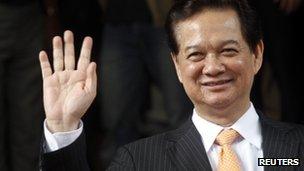Vietnam Prime Minister Nguyen Tan Dung urged to resign
- Published

Nguyen Tan Dung dismissed Wednesday's call for him to resign
A member of the Communist-dominated parliament in Vietnam has in a rare show of dissent told PM Nguyen Tan Dung that he should resign for his mistakes in handling the economy.
Duong Trung Quoc said that it was time for the prime minister to take responsibility, not just apologise.
He urged Mr Dung to lead what he called a resignation culture.
Mr Dung responded to the attack by saying the Communist party had appointed him the top job.
"The party assigned me to continue to be the prime minister," he said.
"I did not lobby, I did not ask for, nor refuse, any assignment given by the party and state."
Mr Dung has been grappling with Vietnam's stagnating economy and a string of scandals.
Correspondents say that the attack on the prime minister on Wednesday was so unusual because it was made in front of TV cameras in parliament.
A second lawmaker, Nguyen Ba Thuyen, was quoted by the AFP news agency as saying that Mr Dung's failure to set out a plan to deal with Vietnam's economic woes had damaged public trust in the Communist leadership.
Vietnam is currently battling slow economic growth, high inflation, falling foreign direct investment and rising concern over the high level of debt in its fragile banking system.
Mr Dung, 62, was spared disciplinary action at a key Communist party meeting last month over a series of scandals that have tainted the country's leadership.
His government is accused of overseeing a culture of corruption at state-owned enterprises like Vietnam Shipbuilding Industry Group (Vinashin) and Vietnam National Shipping Lines (Vinalines).
In March, nine top officials were jailed for their roles in the near-bankruptcy of Vinashin.
In September, the former chairman of Vinalines was arrested abroad and extradited for ''alleged economic crimes''.
Mr Dung has been prime minister since 2006 and came into office amid expectations that he would continue economic and political reforms in the country.
However, a global financial crisis two years later saw Vietnam's economy slump after decades of high growth.
- Published16 October 2012
- Published5 September 2012
- Published30 March 2012